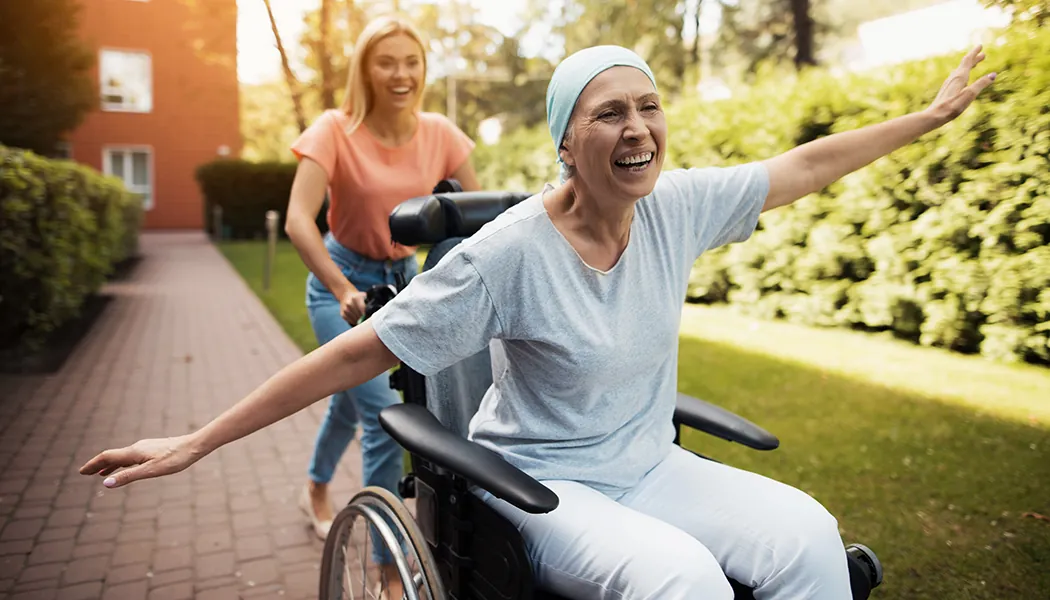Practicing Gratitude to Combat Survivor’s Guilt and Celebrate Survivorship

National Cancer Survivor Day should be a day for celebration and gratitude, but many cancer survivors see this day as a harrowing reminder that they survived a disease that stole the lives of many others.
Throughout their cancer experience, patients face a lot of emotions. The disease can cause fear and anxiety when diagnosed, and it can bring elation when defeated. However, one often overlooked feeling that cancer may introduce is guilt. While many assume the 15.5 million survivors are constantly celebrating their victory over the disease, in reality, they often battle with survivor’s guilt.
What is Survivor’s Guilt?
Society suggests that survivors should feel relieved and lucky to have overcome cancer. The truth, however, is that many survivors have a deep-seated feeling of guilt. The guilt can emerge from questioning why one person survives a disease while another does not. It can also emerge from feeling as if they’re taking life for granted. While feeling guilty is completely normal among many cancer survivors, the big issue is that few people talk about it. It becomes silent suffering that may impact mental health.
Understanding that this is a normal emotion, the National Foundation for Cancer Research (NFCR) strives to support survivors in celebrating their health with a gratitude practice on all days, but especially on National Cancer Survivor Day and Month each June.
Gratitude practice is not meant to teach survivors to only look on the bright side and ignore negative emotions. Rather it supports them in realizing gratitude can exist alongside the very real and understandable negative emotions that they are experiencing.
Engaging daily in a gratitude exercise, such as reflection or journaling, can help survivors develop a gratitude practice that can enrich their overall quality of life and well-being.
Cultivate a gratitude practice and reap the benefits by starting with these five simple steps.
1. Keep a gratitude journal
Can you list five things you are grateful for? They can be big or small – from being able to walk a mile through to your last chemo treatment. Twice a week, try to write down at least five things for which you are grateful. This practice will not only cultivate a sense of gratitude, but studies have also shown that individuals have a healthier resting heart rate when completing gratitude journals.
2. Practice gratitude meditation
Set aside time each day to sit in silence and reflect on things for which you are grateful. While you are meditating, picture in your mind the feeling of gratitude in your body. Practicing gratitude meditation every day will help you develop a gratitude habit that can rewire your brain and lower your heart rate. Research suggests that gratitude meditation stimulates brain regions related to emotion and motivation.
3. Show gratitude for loved ones
When thinking of things for which to be grateful, many people identify loved ones in their life. Celebrate National Cancer Survivor Day with the people you are grateful for, and express your gratitude through conversation, a letter, or through acts of love.
4. Inspire others
A common theme of survivors’ guilt is ‘why me?’ Many people don’t understand why they survived when so many others were not as fortunate. Some find meaning by inspiring and supporting people who are facing the same diagnosis they once battled. Tell your story to those who need to hear, either directly or through NFCR.
5. Celebrate life by saving lives
What better way to celebrate and show gratitude than by supporting others battling cancer? Host a fundraiser – whether big or small – to raise funds for cancer research. Consider a bake sale, an event, or even a social media campaign.
Sign-up to Stay Informed About Cancer Research Breakthroughs with NFCR!
Additional Reads You May Enjoy:
Coping With Cancer—It’s Different for Everyone
A world without cancer is possible. Help us turn lab breakthroughs into life-saving realities.

5.7 Million+
Donors who have fueled NFCR’s mission

$420 Million+
Invested in high-impact research & programs

36+ Labs & Hundreds of
Nobel Laureates & Key Scientists received NFCR funding, driving breakthrough research












